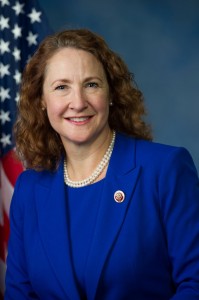At a House Railroad Subcommittee hearing Wednesday morning, Rep. Elizabeth Esty pressed panel members to “get down to brass tacks” on the consequences for railroads that fail to meet Congress’ December 31 deadline for installing Positive Train Control.
“As you can sense from today’s hearing, there is increasing impatience and concern about how long [Positive Train Control implementation] is taking,” Esty said. “I think we really need to get down to brass tacks of what are the carrots and sticks, what are the incentives.”
The American Public Transportation Association recently reported that 71 percent of railroads will fail to implement the accident-prevention technology known as PTC by the end of the year.
At the hearing, Esty voiced concern over whether railroads that fail to meet the deadline will be subject to increased tort liability should they continue to operate in 2016.
“That is obviously a very, very big stick that, again, I think this committee needs to understand what the legal opinion of [the Federal Railroad Administration] about that is as well as the railroads,’” Esty said.
Sarah Feinberg, the acting administrator of the Federal Railroad Administration (FRA), said she along with most railroad companies believe their liabilities will increase on January 1.
Feinberg also said the administration should be granted the authority to test PTC systems and provide for interim safety measures until the technology is implemented. The FRA is currently preparing a plan for fining railroads that operate past the deadline.
To help railroad companies avoid this problem, Feinberg is calling on Congress to provide funding for commuter railroads to install the technology. Esty, too has urged Congress to allocate funds to PTC implementation, and in May offered an amendment authorizing $750 million for the project.
But instead of arguing over who is at fault for the delay in implementation — a debate that has dominated much of the conversation on PTC — Esty urged panel members to focus on the future.
“The past is the past, we are here now, and we are in June of 2015,” Esty said. “How do we get this moving forward to keep people safe?”
Meanwhile, members of Congress are scrambling to negotiate a solution that falls somewhere between Sen. Blunt’s blanket deadline extension to 2020 and Sens. Feinstein and Blumenthal’s plan to allow case-by-case extensions to 2018.
